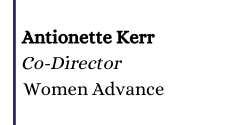For the past few years, I have written about how the low expectations for equal pay has become an undeserved rite of passage in many communities of color. My mother worked 10-plus hour shifts as a dishwasher and cook and still did not make enough to cover food, medicine, rent, plus utilities.
My grandmother lovingly gave me the speech often. She held down multiple jobs as a nursing assistant, a daycare manager, as a quilt shop owner and later as a home health professional while raising a family of twelve. Even in her “retirement” she sold quilts and sat with elderly members of our community.
Black Women are taught they have to “work twice as hard” to be considered successful, a belief so widely accepted that even former First Lady Michelle Obama advances it in speeches across America. I echo the thoughtful sentiments of Guardian writer, Britni Danielle. “There’s one mantra many black parents drill into their children’s heads throughout their life: be twice as good. It goes that as black folks in America, we’ve got to work twice as hard to get half as far as our white counterparts,” she wrote. “Some semblance of this speech has been handed down for generations, and given our history in the US – forced into chattel slavery, oppressed under Jim Crow, and racially stigmatized to this day – it’s proven itself to be true.”
In “modern times,” the gap issue between Black female and white male earnings is, unfortunately, not new. This year, I find myself writing another sad story to report that Black Women’s Equal Pay Day marks the day in the current year when Black women finally catch up to the earnings that white men received over the course of the prior year. On a national level in 2019, Black women had to work seven-and-a-half months—until YESTERDAY, August 13th—to earn what their white male counterparts earned back in 2019.
A recent study of North Carolina women’s earnings reveal they vary considerably by race and ethnicity. Among women in NC working full-time, year-round, Asian/Pacific Islander women have the highest median annual earnings ($40,553), followed closely by white women ($40,180). Women who are multiracial or of another race earn $32,404 annually, Black and American Indian women earn $30,908, and Hispanic women have the lowest median earnings ($24,322).
For all racial and ethnic groups, women in North Carolina have lower median earnings than their male counterparts. Another way of examining earnings differences is to compare the earnings for different groups of women with the largest group in the labor force, white men. Compared with white men, Hispanic women in North Carolina face the largest gap, earning just 49 cents for every dollar earned by white men. Asian/Pacific Islander women face the smallest gap, but still earn only 81.5 percent of white men’s earnings.
Black Women’s Equal Pay Day has held widespread media coverage and social media chants across the country for several years now. And now that the COVID crisis is exposing racism and poverty as their own pandemics, there are more conversations (also known as hashtags) than ever before.
USA Today shared an annual story, “When systemic racism meets the coronavirus, Black women suffer economically,” from Chabeli Carrazana of The 19th.
In addition to being overrepresented at the low-paying end of the spectrum, Black women are underrepresented at the top. Black women make up just 1 percent of the high-paying engineering workforce and 3 percent of computing. Among the few Black women who do break into these careers, discriminatory practices drive out many.
“The original pandemic, racism, has ensured Black women have been at a disadvantage in every conceivable arena — hiring, education, health care, banking — victims of the incomplete crawl toward change,” Carrazana writes. “Now, coronavirus-induced economic turmoil has rotted away what little safety net many of these women could rely on.”
According to CDC data, Black women represent about 11 percent of essential workers even though they’re only 6 percent of the workforce. They’re also one of the only groups for whom unemployment during the pandemic went up from one month to the next, while for others it went down. From healthcare to childcare, about 1.4 million jobs held by Black women have disappeared since February.
Over the next few months, equal pay days will FINALLY come for women of color. This is not a celebration, it’s a sad state of affairs we feel inclined to document and share. Women AdvaNCe will be in partnership with our writers collective and the Justice Center to help families share their stories. We will also focus on policy recommendations that can make these moments of truth more than hashtags. We need real reform, we need new policies, we need you to like and share if our writers’ stories resonate with you!
We can do better!



There are no comments
Add yours